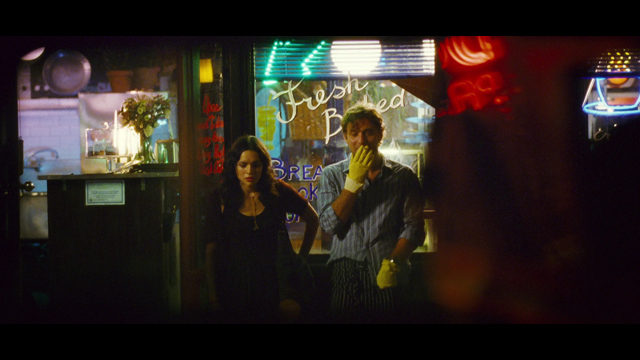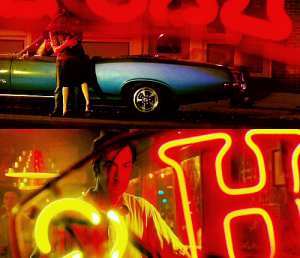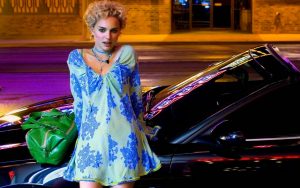This may sound twee, but Wong Kar-Wai doesn’t make films: he makes daydreams. Really, though, doesn’t it? Next thing I’m going to link to a song on YouTube that I swear will change your life, go dancing in a school after hours or teach you to scream your frustrations into an uncaring chasm (oh, you’re already using the Internet? Great! We’ll scratch that off the To-Do list). And yet, given the tone and structuring of so many of his films, and the creative process behind them, writing and rewriting on set and nights before shooting, it’s a hard concept to deny.
To get more specific, they are romantic daydreams. Not love stories, but romantic ideations of professions and concepts and actions all hung on very simple plots to allow for maximum exploration of their beauty and allure. The high contrast black and white photography of a traveler stranded in South America picking up a bouncer gig at a shitty nightclub in Happy Together. The rain-streaked colors of a heartbroken cop eating canned pineapple past its expiration date as a totem to bring an ex back in Chungking Express. Fluorescent light illuminating a hijacked ice cream truck as a lonely maniac gives away free soft serve in the middle of the night in Fallen Angels. They are stories of sad, broken people searching for a balm in unlikely, and unexpectedly beautiful places.
In the case of My Blueberry Nights, Norah Jones plays a jilted New Yorker who skips town following a bad break up, taking to the road to mend her heart and get away from a home that’s suddenly become too close and suffocating, and providing Wong Kar-Wai with an excuse to cut across America and explore three vignettes about broken relationships and their distinct settings.
Now, My Blueberry Nights is something I like to refer to as a “2/3rds” movie, which basically means that it is made up of 2 very closely related elements and 1 element that’s a little more tangentially related. It’s connected, but a little out of step with with everything else around it, and tends to throw off the spell the movie is casting. Here it’s the segment with Natalie Portman, which I’ll get into more a little later, but is a bit of a tonal and – more importantly – a visual outlier.
The film’s single greatest strength is its cinematography, courtesy of Darius Khondji. He’s one of those people to whom you can honestly apply the idiom “every frame is a painting,” because goddam! Just google “Darius Khondji cinematography” and marvel at his use of tone and color and composition. Zodiac, Magic In The Moonlight, Delicatessen. He’s an absolute master of his craft, and he’s playing at 11 on this film, creating a vibrant, low contrast, shallow focus look that constantly incorporates blurry elements into the foreground to obscure and intrude on the focal points of the scene. In the New York scenes this involves shooting through the heavily-lettered windows, bits of painted words gliding across the screen. In the Tennessee segment, great use is made of large overhanging lights with colorful domes. It contributes to that daydream feel, letting the edges of the world blur as it tries to focus in on the drama. It’s only when the movie moves on to the third vignette where the cinematography makes a drastic shift, with clear, deeper focus frames and a look that borders on bleach bypass and lots of direct sunshine. The previous segments have reflected the warm comfort of the night, but the third story is dominated by a harsher look, reflecting the more jaded and cynical character at its center.
Which means it’s probably time to talk about the stories, and the characters therein.
Our through line for this episodic adventure, as I mentioned before, is Norah Jones (I won’t bother with character names, because they’re incidental) as well as Jude Law’s restaurateur, who has also gone through a breakup and falls for Ms. Jones hard and fast. This segment is vintage Wong Kar-Wai: dreamy and elliptical, heavily influenced by the French New Wave with its emphasis on philosophy and experimentation. The latter is best exemplified by Law’s low-resolution, malfunctioning security camera, which at one point statically records a fist fight that breaks out in the restaurant while cycling through a series of color filters. The former is best identified in the bowel of keys Law keeps behind the counter, left behind by the brokenhearted for their exes to pick up. Law (whose own keys are in the bowl) never gets rid of a set, intrigued by the stories attached to them, and the belief that every door should have the option of being opened again. There’s a great intimacy to their scenes together, chatting away into the night and sharing the deserts he would otherwise throw out. (It’s here where the movie gets its title: Jones’ favorite pie is blueberry, a flavor which is left entirely untouched by the end of every night.) In lesser hands this material might be insufferable, but Law and Jones have an easy chemistry and the atmosphere is so comfortable, it’s a lovely little fantasy about being young and pretty and finding companionship in a big, lonely city.
The second segment, when Jones has taken a bus out of town and down into Tennessee, is the film’s strongest. She becomes a fly on the wall and bears witness to a slow-motion tragedy. This segment is the story a melancholy, alcoholic cop (David Strathairn) wallowing in the separation from his wife (Rachel Weisz). I remembered it as a great segment, with good atmosphere, some nice use of Otis Redding, and a pair of killer performances from Strathairn and Weisz. What I hadn’t originally recognized, and what blew me away this time, was the subtext on the toxicity of male privilege. Strathairn is clearly a beloved fixture of the town, and even though he only has one scene where he’s sober, he exudes the kind of professional, but friendly demeanor you see extolled as the ideal of masculinity among his generation. And you get the idea that, between his nightly trips to the bottom of a bottle, this is enough to get the town to ignore every red flag he sends up. He assaults Weisz’s boyfriend and his friends, and at one point pulls on a gun on Weisz herself, threatening to shoot her in the back if she leaves the bar. And there are no consequences either time. The EMTs patch him up after the fight, and his bartender friend gently pushes his gun down when he threatens Weisz. He just keeps coming back to the bar and accumulating relapse chips from AA, until he wraps his car into a telephone poll. Even then the town assigns him no responsibility, the cause of death being ruled an accident. And Weisz? Everyone’s pleasant to her, but they all blame her for his death, painting her as unreasonable for walking away. Weisz has given off a weariness throughout the segment, but after Strathairn dies and the town turns on her, she has a full-on breakdown, crushed under the weight of judgemental stares and unspoken accusations. It all comes to a head in a curbside monologue, where she goes over the relationship with Strathairn, how they met when he pulled her over for speeding, and the uneven power dynamic that defined them. He got her because he wanted her, and her feelings were secondary. It’s a powerful monologue and performance, all done in one long, static take. It’s an incredible high note on which to end an utterly fantastic segment, and is followed by the segment that almost sinks the film.
In the third segment, Natalie Portman plays a card shark who borrows some money from Jones after getting tanked with a bad hand, and takes her on a trip to Vegas. Portman is wry and cynical, in stark contrast to Jones’ open and trusting nature, with a father who has done nothing but let her down. Almost every aspect of this story feels like a misstep (but especially her dialogue, almost exclusively pithy cross-stitch slogans), which goes back to my 2/3rds issue from earlier. I mentioned before how the cinematography doesn’t quite match, with its unobstructed compositions and wide open spaces, but thematically it’s the only segment not about romantic heartbreak. It’s about platonic heartbreak, which is connected when you think about, but there isn’t enough variety in the stories to justify that subtle distinction, and its placement only heightens the differences. As I write this, I’m reminded of Chungking Express, which also features a thematically-distal segment featuring a fatigued femme fatale, but is smartly positioned near the front, within the half that blends crime story and romantic longing before the film transitions into straight romantic comedy. Portman’s drifting nomad would make much more sense as an impetus for Jones to leave New York in the first place. As it stands, having it be the last leg of Jones’ cross-country journey is a letdown.
This is, in many ways, a very familiar story: Hollywood brings over some hot international talent, imposes their rules on them, and the result is watered-down compromise that feels like a pale imitation of itself and is ravaged by fans and critics. That is more or less what happened, with many considering this Wong Kar-Wai’s worst film. And yet… the movie as a Wong Kar-Wai film is a *lot* more intact than you might think. About 2/3rds of it is typically brilliant Wong Kar-Wai, and the segment that doesn’t work is one or two tweaks away from working. There’s a lot to love here (especially the cinematography), and it really didn’t deserve the critical drubbing it got upon release. Have some pie and give it another shot.




